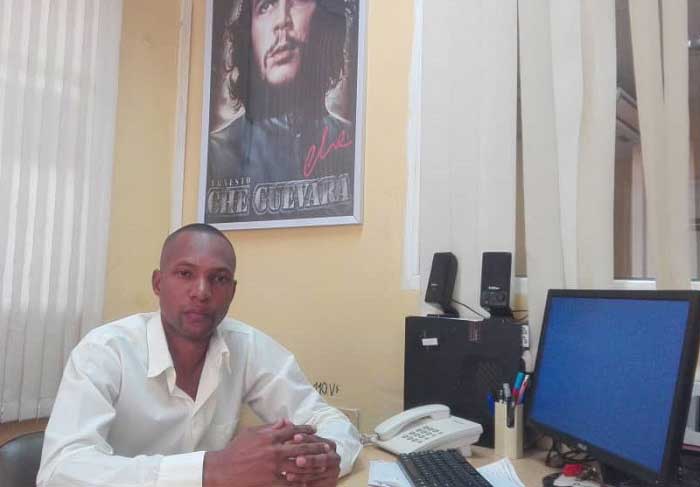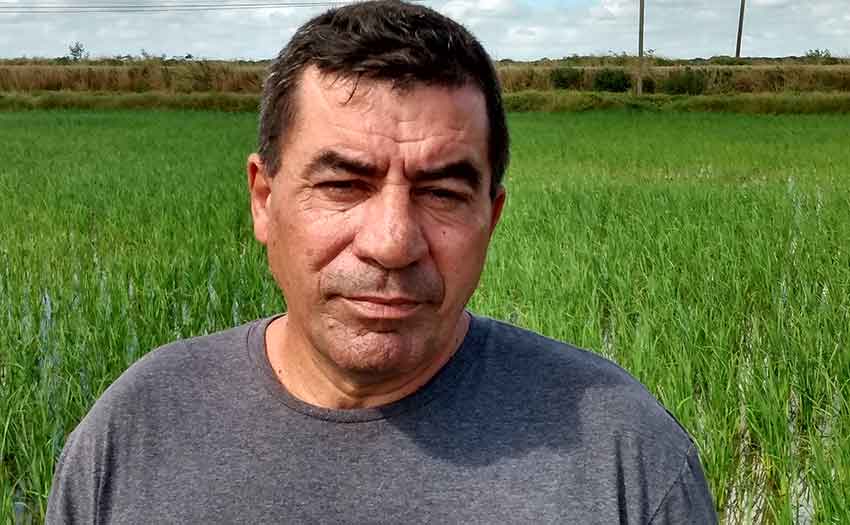
“Bankarization, if it were available to everyone with technological possibilities and knowledge, would be wonderful,” says producer Alexander González Ramos, who belongs to the Rogelio Rojas credit and services cooperative (CCS in Spanish), in the municipality of Colombia.
The process, indicated by the Central Bank of Cuba (BCC in Spanish) through Resolution 111, is presented as a necessity because of the shortage of cash, and as an impulse to modernize the economy. One of its basic principles is that the user decides the method of payment to be used.
 Alexander, from his farm, belonging to the 7 Borbollón popular council, mentions that, in the peasant universe, most of them do not have a cell phone that allows them to use Transfermóvil, and some have one but do not master the technology. In addition, he says, banking services in the territory are distant for many of them.
Alexander, from his farm, belonging to the 7 Borbollón popular council, mentions that, in the peasant universe, most of them do not have a cell phone that allows them to use Transfermóvil, and some have one but do not master the technology. In addition, he says, banking services in the territory are distant for many of them.
Another limitation, says González Ramos, “is the lack of acceptance of payment by transfer or use of the QR code, and not only in non-state establishments. As a country policy, its existence is positive, but because of the aforementioned, there will be those who will not be able to bank in the agricultural environment for years”.
From the Banco de Créditos y Comercio (Bandec in Spanish), in this southern town, its director, Reynier Viñales Castellanos, states that “there are still many problems, doubts, and concerns about the implementation of bankarization. The peasant sector is very vulnerable due to the remoteness of the branch, but we take a different view, here they are protected with the operations”.
The territory of Colombia has an elongated geography, there are rural settlements more than 30 kilometers away from the municipal capital, which implies that they are distant from Internet connectivity and that it is difficult for them to move to the urban area, due to the state of the roads and the transportation situation.
Bandec's manager is aware that “several places are in silent zones and with their bank accounts the farmers cannot carry out the desired operations. But at the branch, we give them the cash they demand for the eventual payments of their activity in the field”.
 Viñales Castellanos points out that, at the moment, the issue of cash, they are directing it if it is a customer's own need, whether it is for personal expenses. “But if it is directed to a purchase and sale between economic actors, as well reflected in Resolution 111, when the operation exceeds five thousand pesos there is no cash payment. It must be by transfer, whether it is for a purchase or sale of a yoke of oxen, machinery, equipment, or animals... These payments only mediate by digital means”.
Viñales Castellanos points out that, at the moment, the issue of cash, they are directing it if it is a customer's own need, whether it is for personal expenses. “But if it is directed to a purchase and sale between economic actors, as well reflected in Resolution 111, when the operation exceeds five thousand pesos there is no cash payment. It must be by transfer, whether it is for a purchase or sale of a yoke of oxen, machinery, equipment, or animals... These payments only mediate by digital means”.
He points out that from the branch they urge farmers who have points of sale in the municipality to make efficient use of the QR code. “Because it makes life easier for the villagers. It is not an obligation, it is where conditions warrant it,” he remarks.
As for the milk he details that they are being protected to 50 percent payment in cash and the rest in magnetic card, of which digital amount, in certain occasions, some demand the physical money. “If it is not at that minute, we write them down, then we locate them and we make the payment without problems”.
For producer Alexander González, the fact of having the technology, residing in the urban perimeter, and personal relationships, “has given me the possibility of using the money put in a card, that has not been a dilemma. But the complaints are repeated, and the farmers find it complex to be coming to town. How many times do they go out to get part of the money or nothing?”.
He considers that the study should be more objective, evaluating on a case-by-case basis, who can be banked based on the above. The other thing, he says, is that severe measures should be taken against those economic actors who refuse to accept payment through the different channels.
FROM “AMANCIO”, MORE ARGUMENTS
In the municipality of Amancio, an eminently agricultural locality and like others with difficulties in access to technologies, doubts also abound if we talk about bankarization among men and women facing the furrow.
Pedro Rubiales Escalona, president of the CCS Lino Álvarez, specifies that among the benefits is that there is no need to use cash to make purchases since electronic means can be used.
However, he points out as a negative aspect of the non-existence of ATMs in the region, which causes large crowds at the Bandec branch bank. He adds that there they have to wait in long lines, just like the rest of the population, to receive one or two thousand pesos and, sometimes, it takes them until 3:00 in the afternoon to do so.
The president of the National Association of Small Farmers (ANAP in Spanish) in “Amancio”, Yaismel Téllez Palmero, says that the main obstacle in this area is the low number of markets to buy inputs and, in general, they have to pay for them in cash.
He points out that the Grupo Empresarial de Logística del Ministerio de la Agricultura (Gelma in Spanish) offers some resources, but at very high prices, so they are forced to buy them in the informal market always with physical money.
 “Bankarization allows us to transfer directly to the producers' cards, without having to walk around with a folder full of bills in those mountains,” emphasizes Ernesto Concepción Conesa, president of the CCS Camilo Cienfuegos.
“Bankarization allows us to transfer directly to the producers' cards, without having to walk around with a folder full of bills in those mountains,” emphasizes Ernesto Concepción Conesa, president of the CCS Camilo Cienfuegos.
In addition, he maintains, it avoids and prevents monetary diversions that have often affected us, and makes possible the immediate payment of supplies and services rendered.
Concepción Conesa underlines what is a reality shared by hundreds if it is a matter of disadvantages of the process in his demarcation, although they try to continue to weather the storm: it forces farmers to repeatedly leave their farm; they remain in long lines at the bank, while they could be cultivating the land; the availability of cash in these institutions does not meet the minimum requests they need for their expenses; in almost no establishment or points of sale they accept payment by transfer and not all farmers have a cell phone. The situation is aggravated by the poor or scarce connection that prevails in the territory.
Thus, with many debts, bankarization in “Colombia” and “Amancio” is going on. The lack of technologies and practical strategies tarnish a procedure that needs to take a different course that protects, supports, encourages, and does not impose obstacles to those who have the high mission of day by day, and from sunrise to sunset, to put food on the table.





